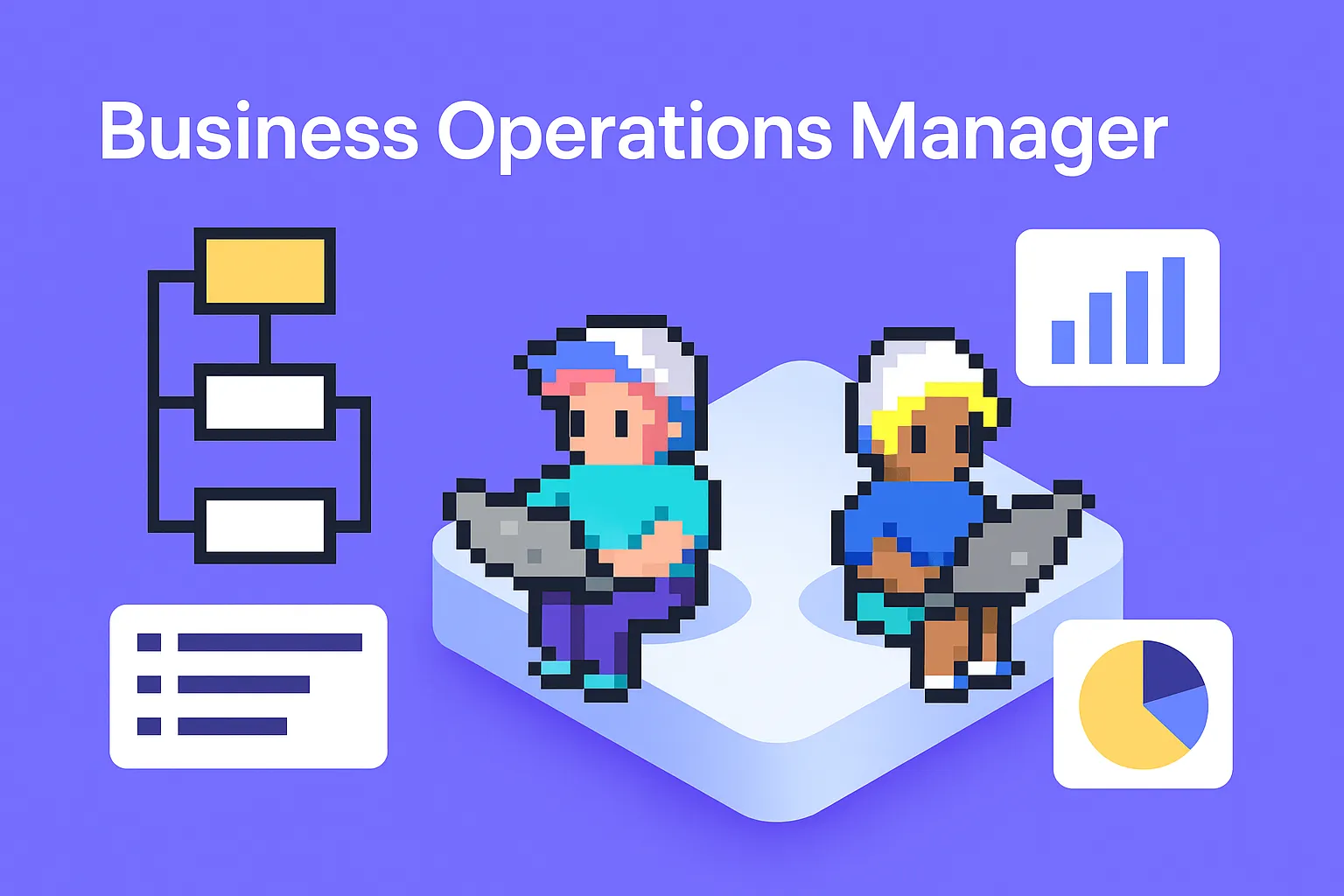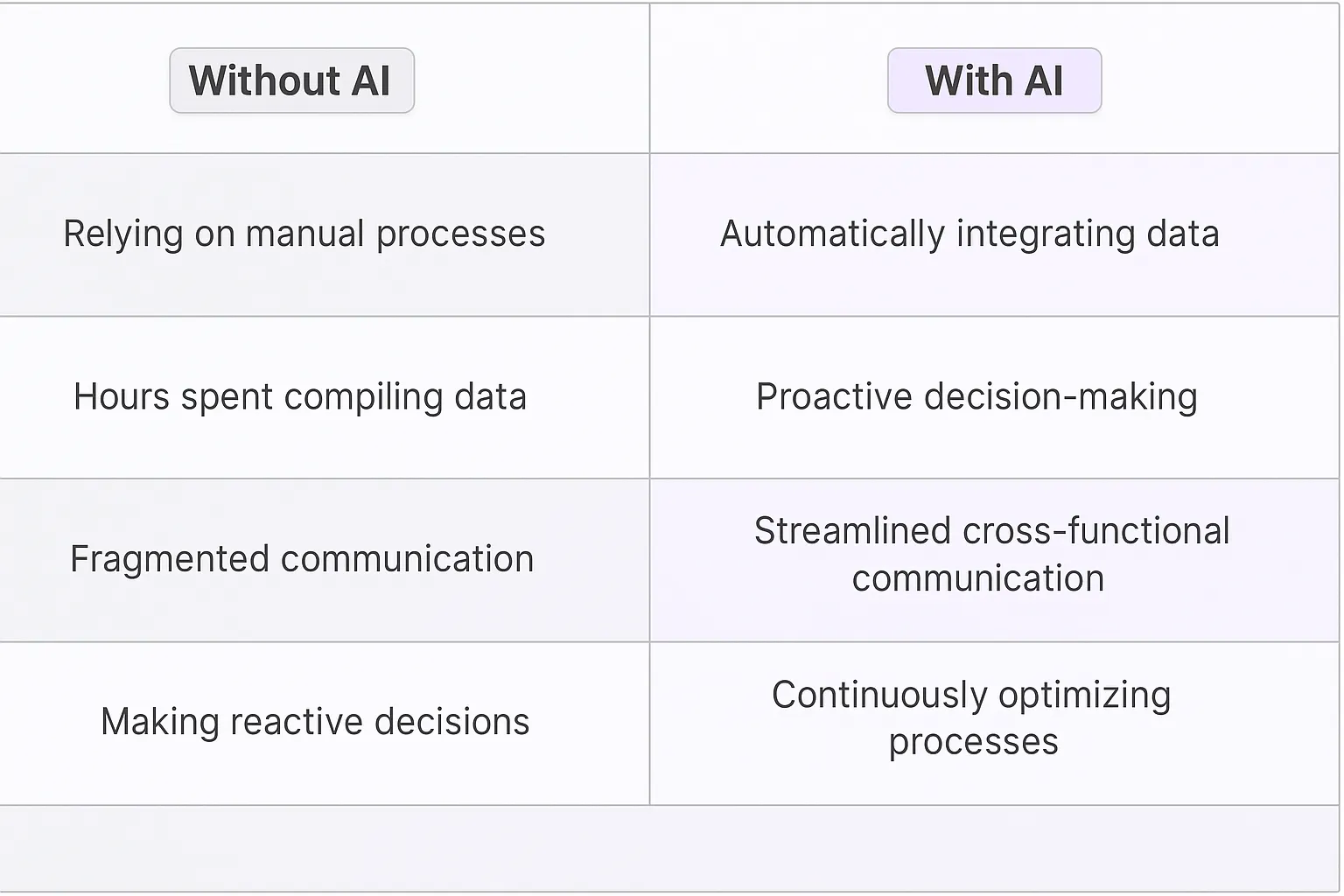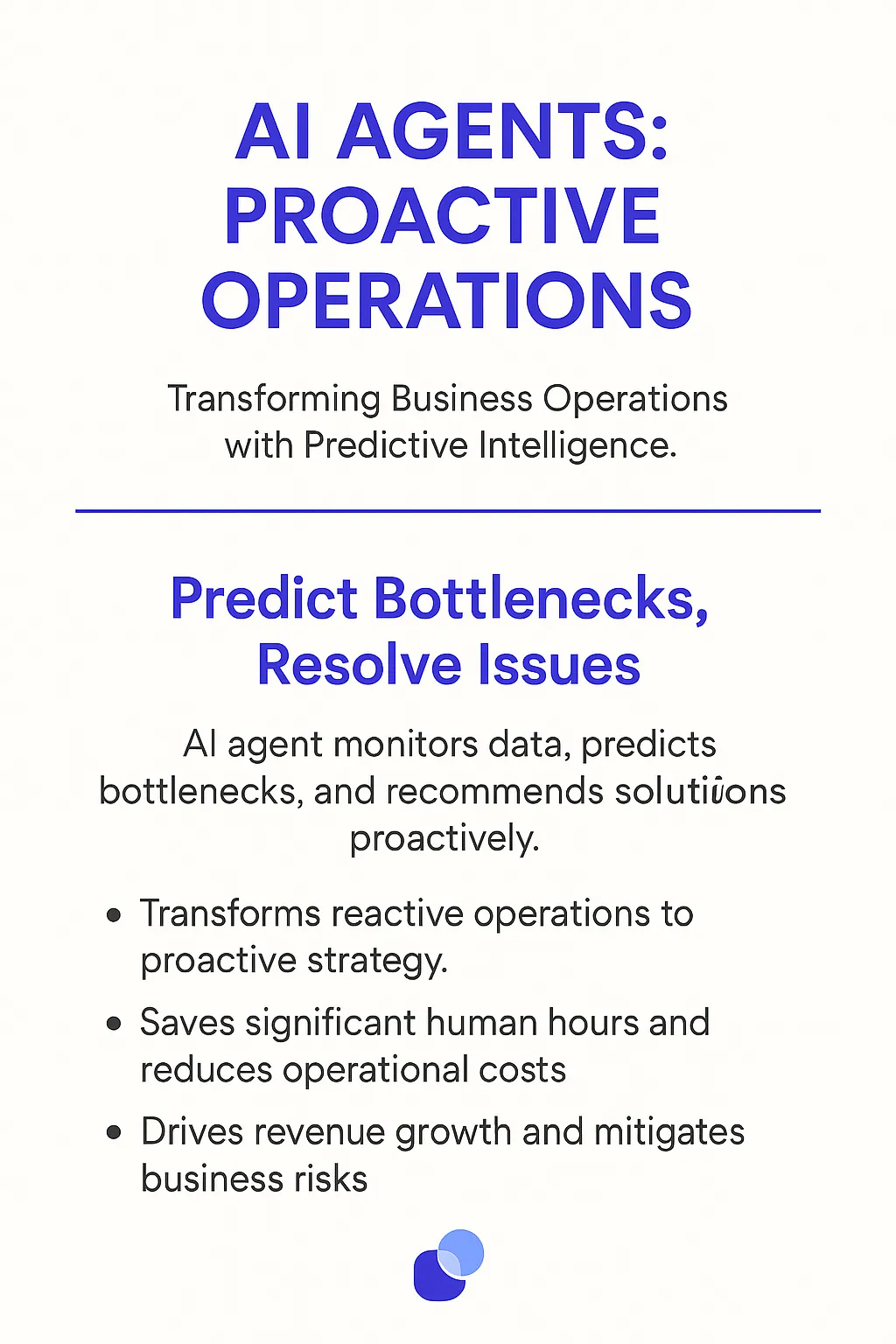A Business Operations Manager is a crucial role responsible for overseeing and optimizing an organization's day-to-day operations. They're the maestros of efficiency, coordinating various departments, managing resources, and ensuring smooth workflows. In the past, these managers relied heavily on manual processes and disconnected tools. Now, with the advent of AI agents, their role is evolving into something far more strategic and impactful.
The modern Business Operations Manager, augmented by AI agents, possesses a suite of powerful capabilities:1. Data Integration: AI agents pull information from multiple sources, providing a holistic view of operations.2. Predictive Analytics: These digital teammates forecast trends and potential issues, enabling proactive management.3. Process Optimization: AI continuously analyzes and improves workflows, identifying bottlenecks and suggesting enhancements.4. Automation: Repetitive tasks are handled by AI, freeing human managers to focus on strategic initiatives.5. Cross-functional Communication: AI agents facilitate better information flow between departments, breaking down silos.6. Real-time Decision Support: With AI-powered insights, managers can make data-driven decisions on the fly.

Before AI agents entered the scene, business operations managers were stuck in a world of spreadsheets, manual data entry, and endless email chains. They'd spend hours sifting through reports, coordinating teams, and trying to piece together insights from fragmented data sources. It was like trying to solve a 1000-piece puzzle while blindfolded – frustrating, time-consuming, and often inaccurate.
The tools at their disposal were static and siloed. Think clunky ERPs, disconnected CRMs, and project management software that barely talked to each other. Managers were essentially high-paid data wranglers, spending more time compiling information than actually using it to drive business decisions.
Enter AI agents – the secret weapon for business operations managers who want to level up their game. These digital teammates are like having a team of expert analysts, strategists, and coordinators at your fingertips 24/7.
First off, AI agents are data integration ninjas. They can pull information from multiple sources, clean it up, and serve it to you on a silver platter. No more spending half your day in Excel hell. This means you're making decisions based on a complete picture, not just fragments.
But here's where it gets really interesting: predictive analytics. AI agents don't just show you what happened; they give you a glimpse into the future. They can spot trends and patterns that human eyes might miss, helping you anticipate issues before they become full-blown crises. It's like having a crystal ball for your business operations.
Process optimization is another game-changer. AI agents can analyze your workflows, identify bottlenecks, and suggest improvements. They're constantly learning and adapting, which means your operations get smarter over time. It's like having a Six Sigma black belt on steroids working for you around the clock.
Let's talk about the holy grail of business ops: automation. AI agents can take over repetitive tasks, freeing up your human team to focus on high-value, strategic work. From scheduling to resource allocation, these digital teammates handle the grunt work while you focus on the big picture.
Finally, there's the communication aspect. AI agents can act as the connective tissue between different departments, ensuring everyone's on the same page. They can translate complex data into actionable insights for different stakeholders, bridging the gap between tech speak and business lingo.
In essence, AI agents are transforming business operations managers from reactive firefighters into proactive strategists. They're not just tools; they're force multipliers that can give your business a serious edge in today's hyper-competitive landscape.

Business operations managers are the unsung heroes of organizational efficiency. They're the ones who keep the gears turning smoothly, often juggling multiple complex processes simultaneously. Enter AI agents - the digital teammates that could redefine how these managers operate.
One of the most impactful use cases for AI in business operations is process optimization. These digital teammates can analyze vast amounts of operational data, identifying bottlenecks and inefficiencies that human eyes might miss. They can simulate different process flows, predicting outcomes and suggesting improvements that could save both time and resources.
Another key area is compliance management. AI agents can keep track of ever-changing regulations across different jurisdictions, ensuring that business processes remain compliant. They can flag potential issues before they become problems, allowing operations managers to proactively address compliance concerns rather than reactively fixing violations.
Resource allocation is another process ripe for AI enhancement. These digital teammates can analyze historical data, current trends, and future projections to suggest optimal resource distribution. This could range from staff scheduling to budget allocation, ensuring that resources are used where they'll have the greatest impact.
On a more granular level, AI agents can take on numerous tasks that typically consume a business operations manager's time. For instance, they can automate report generation, pulling data from various sources and compiling it into coherent, insightful documents. This frees up the manager to focus on interpreting the data and making strategic decisions.
AI can also handle routine communication tasks. It can draft emails, schedule meetings, and even provide initial responses to common queries from team members or other departments. This doesn't replace human interaction, but it does filter out the noise, allowing managers to focus on high-value communications.
Another task where AI shines is in predictive maintenance. By analyzing equipment performance data, AI can forecast when machines are likely to need servicing, allowing for proactive maintenance that minimizes downtime and extends equipment life.
Inventory management is yet another area where AI can make a significant impact. These digital teammates can analyze sales trends, supply chain data, and even external factors like weather patterns to optimize inventory levels, reducing both stockouts and excess inventory.
The potential of AI in business operations is vast and largely untapped. As these digital teammates become more sophisticated, they'll increasingly become indispensable partners to human managers, augmenting their capabilities and allowing them to focus on the most strategic aspects of their roles. The future of business operations isn't about AI replacing humans - it's about the powerful synergy between human insight and AI capabilities.

AI agents are reshaping the landscape of business operations management, offering a level of efficiency and insight that was once unimaginable. These digital teammates are not just tools; they're becoming integral parts of high-performing teams across various sectors. Let's dive into some concrete examples of how these AI agents are transforming workflows and processes in different industries.
What's particularly exciting is how these AI agents adapt to the unique challenges of each industry. They're not one-size-fits-all solutions, but rather highly specialized digital colleagues that can be tailored to specific operational needs. From manufacturing to healthcare, retail to finance, these AI agents are proving their worth by tackling complex tasks, analyzing vast amounts of data, and providing actionable insights that drive business growth.
The following use cases demonstrate the transformative power of AI in business operations management. They showcase how these digital teammates are not just automating routine tasks, but also enhancing decision-making processes, improving resource allocation, and ultimately contributing to the bottom line in ways that were previously inconceivable. Whether it's supply chain management or predictive analytics, these AI agents are revolutionizing how businesses operate.
The retail industry is ripe for disruption, and Business Operations Manager AI agents are leading the charge. These digital teammates are transforming how stores operate, from inventory management to customer service.
Take a mid-sized clothing retailer with 50 locations across the country. Traditionally, each store manager would spend hours poring over spreadsheets, trying to optimize stock levels and staff schedules. Enter the Business Operations Manager AI.
This AI agent ingests data from multiple sources - point-of-sale systems, foot traffic sensors, weather forecasts, and even social media trends. It then crafts hyper-localized strategies for each store. In San Francisco, it might recommend stocking more raincoats in anticipation of an unseasonably wet week. In Miami, it could suggest extending store hours to capitalize on a sudden influx of tourists.
But the AI's role doesn't stop at recommendations. It actively manages inventory, automatically triggering restock orders when supplies run low. It schedules staff with surgical precision, ensuring peak coverage during busy periods while minimizing overtime costs.
The result? A retail operation that's responsive, efficient, and data-driven. Store managers are freed from mundane tasks, allowing them to focus on high-touch customer interactions and team leadership. The company sees a 15% reduction in inventory costs and a 20% increase in sales per square foot.
This isn't science fiction - it's the new reality of retail operations. Business Operations Manager AI agents are turning stores into lean, mean, selling machines. And this is just the beginning. As these AIs learn and evolve, they'll reshape the retail landscape in ways we can barely imagine.
The manufacturing sector is undergoing a seismic shift, and Business Operations Manager AI agents are at the epicenter. These digital teammates are redefining how factories operate, from supply chain management to production line optimization.
Consider a medium-sized automotive parts manufacturer with facilities spread across three continents. Previously, coordinating global operations was a Herculean task, fraught with inefficiencies and communication gaps. Enter the Business Operations Manager AI.
This AI ingests real-time data from IoT sensors on production lines, ERP systems, supplier databases, and even geopolitical news feeds. It then orchestrates a symphony of operations across the entire manufacturing ecosystem. In Detroit, it might adjust production schedules to account for an impending steel tariff. In Shanghai, it could reroute component shipments to avoid port congestion.
The AI's capabilities extend far beyond reactive measures. It proactively optimizes production processes, using machine learning to identify inefficiencies that human managers might miss. It predicts maintenance needs before equipment fails, scheduling downtime during low-demand periods. It even negotiates with suppliers in real-time, securing the best prices for raw materials based on current market conditions.
The impact is profound. The manufacturer sees a 30% reduction in downtime, a 25% improvement in supply chain efficiency, and a 20% increase in overall productivity. But the real magic happens at the human level. Plant managers, freed from the drudgery of constant firefighting, can focus on innovation and strategic planning.
This isn't just incremental improvement - it's a fundamental reimagining of manufacturing operations. Business Operations Manager AI agents are turning factories into adaptive, self-optimizing organisms. And we're just scratching the surface. As these AIs continue to evolve, they'll reshape the manufacturing landscape in ways that will make today's smart factories look positively prehistoric.
The manufacturing sector is notoriously resistant to change, but those who embrace this AI-driven revolution will leave their competitors in the dust. It's not just about efficiency gains - it's about creating entirely new business models and competitive advantages. The future of manufacturing isn't just automated - it's intelligently orchestrated.
Implementing a Business Operations Manager AI Agent isn't just a plug-and-play solution. It's more like trying to teach a newborn how to run a Fortune 500 company overnight. The technical hurdles are significant and multifaceted.
First off, data integration is a beast. Your AI agent needs to interface with a smorgasbord of systems - ERP, CRM, HR software, financial tools, and probably that ancient legacy system Bob from accounting refuses to let go. It's like trying to get a group of toddlers to perform a synchronized swimming routine.
Then there's the AI model itself. Training it to understand the nuances of your specific business operations is like teaching a fish to climb a tree. It requires massive amounts of high-quality, relevant data, which many businesses simply don't have lying around.
Security and privacy concerns are another can of worms. Your AI agent will be handling sensitive business data, so you need Fort Knox-level security. But make it too secure, and you'll throttle its ability to actually do its job effectively.
On the operational side, things get even messier. Introducing an AI Business Operations Manager is like dropping a Martian into your office and expecting everyone to just roll with it.
Change management becomes crucial. You're not just implementing new software; you're fundamentally altering how people work. Expect resistance. Some employees will view the AI as a threat to their jobs. Others will stubbornly stick to their "tried-and-true" methods, even if those methods are as outdated as a flip phone.
There's also the challenge of defining the AI's role and authority. How much decision-making power do you give it? Too little, and it's just an expensive paperweight. Too much, and you risk it making critical errors that could cost your business dearly.
Lastly, there's the ongoing maintenance and improvement of the AI. It's not a set-it-and-forget-it solution. You need a dedicated team to monitor its performance, fix bugs, and continuously train it as your business evolves. It's like having a digital child that never grows up but constantly needs new shoes.
Change management becomes crucial when implementing a Business Operations Manager AI Agent. You're not just implementing new software; you're fundamentally altering how people work. Expect resistance. Some employees will view the AI as a threat to their jobs. Others will stubbornly stick to their "tried-and-true" methods, even if those methods are as outdated as a flip phone.
Implementing a Business Operations Manager AI Agent is a complex endeavor that requires careful planning, significant resources, and a willingness to embrace change. It's not for the faint of heart, but for those who pull it off, the potential rewards are enormous.
The integration of AI agents into business operations management marks a paradigm shift in how organizations function. These digital teammates are not just tools; they're catalysts for transformation, turning reactive management into proactive strategy.
While the benefits are clear - from enhanced efficiency and predictive capabilities to freed-up human potential - the journey isn't without its challenges. Technical hurdles like data integration and security, coupled with operational challenges such as change management and role definition, require careful navigation.
Yet, for those who successfully implement these AI agents, the rewards are game-changing. We're witnessing the birth of a new era in business operations - one where human intuition and AI capabilities synergize to create unprecedented levels of operational excellence.
As we look to the future, it's clear that the most successful organizations will be those that embrace this AI-driven revolution. The Business Operations Manager of tomorrow won't just manage operations - they'll orchestrate a symphony of human and artificial intelligence, composing the future of business in real-time.